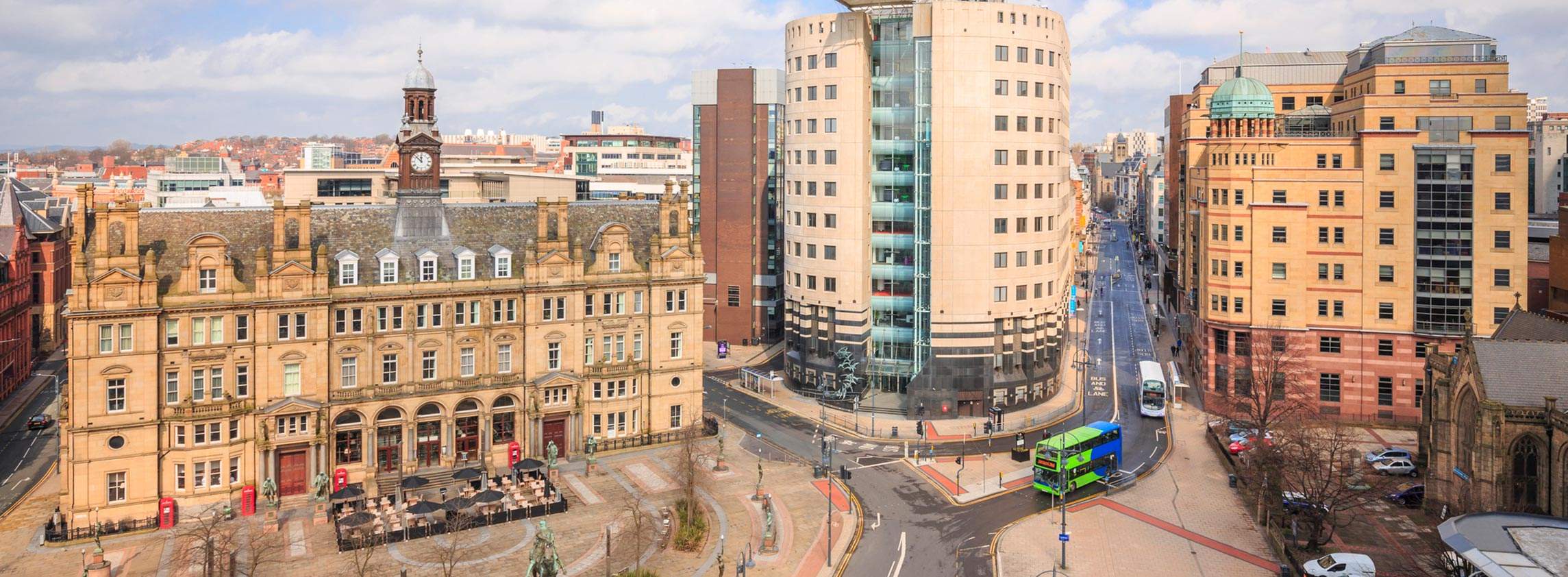The office market continues to rebound in Leeds as we move towards the end of 2021
Demand for office space in Leeds city centre rebounded in 2021, with take-up at the end of Q3 totalling 478,000 sq ft. Q1–Q3 2021 take-up exceeded Q1–Q3 2020 by 92%, albeit marginally below the five-year average. This is 42% higher than the 2020 annual take-up of 337,000 sq ft, albeit 10% lower than the five-yearly Q3 pre-Covid average of 530,000 sq ft. Grade A space accounted for 45% of space let in Q1–Q3 2021 and is already 2% higher than the 2020 annual figure.
The Public Sector was the most active sector in the first three quarters of 2021, accounting for 22% of take-up, closely followed by the Professional Services sector, accounting for 20%. Serviced office providers – incspaces, Instant Offices and 2-Work – signed up to over 50,000 sq ft of space in Leeds city centre, illustrating the relevance of the serviced office sector as businesses seek space that incorporates flexibility, collaboration and improved amenities to attract ‘future’ talent.
There were 12 deals over 10,000 sq ft in the first three quarters of 2021, with the largest being the 83,000 sq ft pre-let to law firm DLA Piper at City Square House
Clare Bailey, Director, Savills Research
There were 12 deals over 10,000 sq ft in the first three quarters of 2021, with the largest being the 83,000 sq ft pre-let to law firm DLA Piper – a considerable show of confidence with the company making a commitment to Leeds with their pre-let at City Square House.
Supply stood at 733,731 sq ft, reflecting a 9% decrease since Q2 2021 and 25% below the five-year average level. When using the five-year average take-up, there is currently just under a years’ worth of Grade A supply available, which is considered to be an undersupply. The vacancy rate in Leeds currently stands at 6.4%, which is significantly below the 10-year average of 10.2%. Grade A vacancy rate stands at just 2.9%, compared with Manchester at 6.1% and Birmingham at 1.7%.
There has been limited investment transactional evidence for offices in Leeds in Q3 and the start of Q4, and the last significant deal was the purchase of Broad Gate by Revcap for £85m. Sentiment is picking up, however, and we are actively marketing and tracking a number of office assets which are generating a good level of interest.
Year to date, the city has seen a total of circa £145 million of office investments transacted and, furthermore, we are aware of an additional £70 million of assets in solicitors' hands, and a further circa £30 million being marketed. We, therefore, anticipate that investment volumes for the year will be in line with the long-term average.

Image: kelvinjay
There is a growing need for affordable creative space within Leeds city region
Leeds has long been a trail-blazer, with its longstanding centre of excellence for the Financial and Business Services sector and impressive leisure and retail offer shaping the look and feel of the city.
It’s the last decade, however, that has witnessed the most significant change. The city has seen outstanding growth in the education, tech and life sciences sectors. However, providing affordable and interesting workspaces is crucial to ensuring that cities such as Leeds are at the forefront of the tech and creative industries, and therefore a draw for talent. Co-working spaces have become a crucial component of the Leeds office market. They’re not just a place to work, but their relaxed and sociable environment also enhances the creativity and productivity that helps startups succeed and grow.
There are also a number of creative spaces and organisations that help develop and support local creatives, as well as multiple project spaces where you can meet and collaborate with other creatives. From Duke Studios to Open Innovations and Leeds Hackspace, these community-led co-working spaces are nurturing the tech companies of the future, enabling them to develop a positive relationship with the city.
From Duke Studios to Open Innovations and Leeds Hackspace, these community-led co-working spaces are nurturing the tech companies of the future, enabling them to develop a positive relationship with the city
Clare Bailey, Director, Savills Research
However, no single organisation can achieve the creation of affordable workspaces on its own. The creation of such spaces requires joined-up thinking and a willingness to work together. As property owners, councils often have unused or under-used assets that can be repurposed as workspace, either for long-term use or as ‘meanwhile’ space awaiting redevelopment. Both private developers and planners should also encourage ‘meanwhile’ use of space prior to development. This is a good opportunity for providers to test their concept, provide a service to the local community, and brand a site while it’s undergoing redevelopment.
Leeds is now working with partners to put life into vacant shops across the city centre. The city is exploring how ‘meanwhile’ activity can help to give roots to new projects that will play a key role in harnessing the energy, creativity and momentum of the city’s bid to be European Capital of Culture 2023.
Over the last decade, Leeds has supported numerous independently led ‘meanwhile’ use projects, with notable successes achieved in partnership with East Street Arts.
A key example is East Street Arts collaboration with Creative Space Management and the West Yorkshire Combined Authority – in response to the declining high street in a post-retail context – the project looks at temporary use of buildings and land owned by the various councils in Leeds city region. The aim of this work was to advocate for ‘meanwhile’ space use of the assets owned by the councils with a focus on repurposing them for creative workspace and activities.
